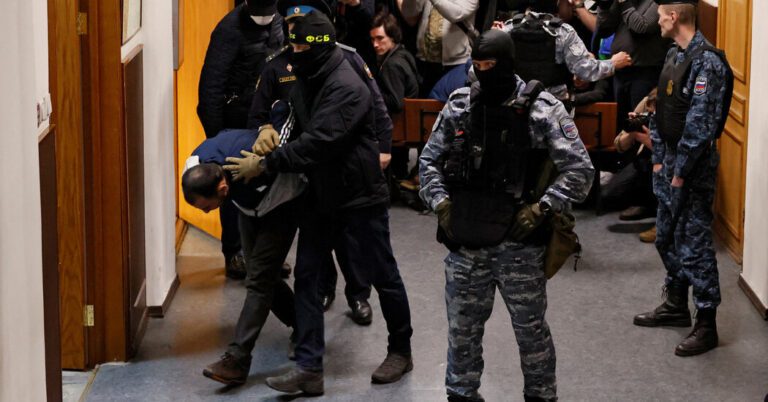
[ad_1]
The four men suspected of carrying out a bloody attack on a concert hall near Moscow, killing at least 137 people, were arraigned in a district court late Sunday and charged with committing a terrorist act.
The four, who were from Tajikistan but worked as migrant laborers in Russia, were remanded in custody until May 22, according to state and independent media outlets reporting from the proceedings, at Basmanny District Court. They face a maximum sentence of life in prison.
The press service of the court only announced that the first two defendants, Dalerjon B. Mirzoyev and Saidakrami M. Rachalbalizoda, pleaded guilty to the charges. It did not specify any plea from the other two, Mediazona, an independent news outlet, reported.
The men looked severely battered and injured as each of them was brought into the courtroom separately. Videos of them being tortured and beaten while under interrogation circulated widely on Russian social media.
Muhammadsobir Z. Fayzov, a 19-year-old barber and the youngest of the men charged, was rolled into the courtroom from a hospital emergency room on a tall, orange wheelchair, attended by a doctor, the reports said. He sat propped up in the wheelchair inside the glass cage for defendants, wearing a catheter and an open hospital gown with his chest partially exposed. Often speaking in Tajik through a translator, he answered questions about his biography quietly and stammered, according to Mediazona.
Mr. Rachabalizoda, 30, had a large bandage hanging off the right side of his head where interrogators had sliced off a part of his ear and forced it into his mouth, the reports said, with the cutting captured in a video that spread online.
The judge allowed the press to witness only parts of the hearings, citing concerns that sensitive details about the investigation might be revealed or the lives of court workers put at risk. It is not an unusual ruling in Russia.
Russia’s Federal Security Services announced on Saturday that 11 people had been detained, including the four charged men, who were arrested after the car they were fleeing in was intercepted by the authorities 230 miles southwest of Moscow.
In the attack, on Friday night, four gunmen opened fire inside the hall just as a rock concert by the group Piknik was due to start. They also set off explosive devices that ignited the building and eventually caused its roof to collapse. Aside from the dead, there were 182 injured, and more than 100 remain hospitalized, according to the regional health ministry.
President Vladimir V. Putin used the fact that the highway where the men were detained leads to Ukraine to suggest that the attack was somehow linked to Ukraine’s war effort. But the United States has said repeatedly that the attack was the work of an extremist jihadi organization, the Islamic State, which claimed responsibility.
The first charged, Mr. Mirzoyev, who had a black eye and cuts and bruises all over his face, leaned for support against the glass wall of the court cage as the charge against him was read. Mr. Mirzoyev, 32, has four children and had a temporary residence permit in the southern Siberian city of Novosibirsk, but it had expired, the reports said.
Mr. Rachabalizoda, married with a child, said he was legally registered in Russia but did not remember where.
The fourth man charged, Shamsidin Fariduni, 25, married with an 8-month-old baby, worked in a factory producing parquet in the Russian city of Podolsk, just southwest of Moscow. He had also worked as a handyman in Krasnogorsk, the Moscow suburb where the attack took place at Crocus City Hall, at a concert venue within a sprawling shopping complex just outside the Moscow city limits.
The Islamic State has been able to recruit hundreds of adherents among migrant laborers from Central Asia in Russia who are often angry about the discrimination they frequently face.
Alina Lobzina, Paul Sonne and Milana Mazaeva contributed reporting.
[ad_2]